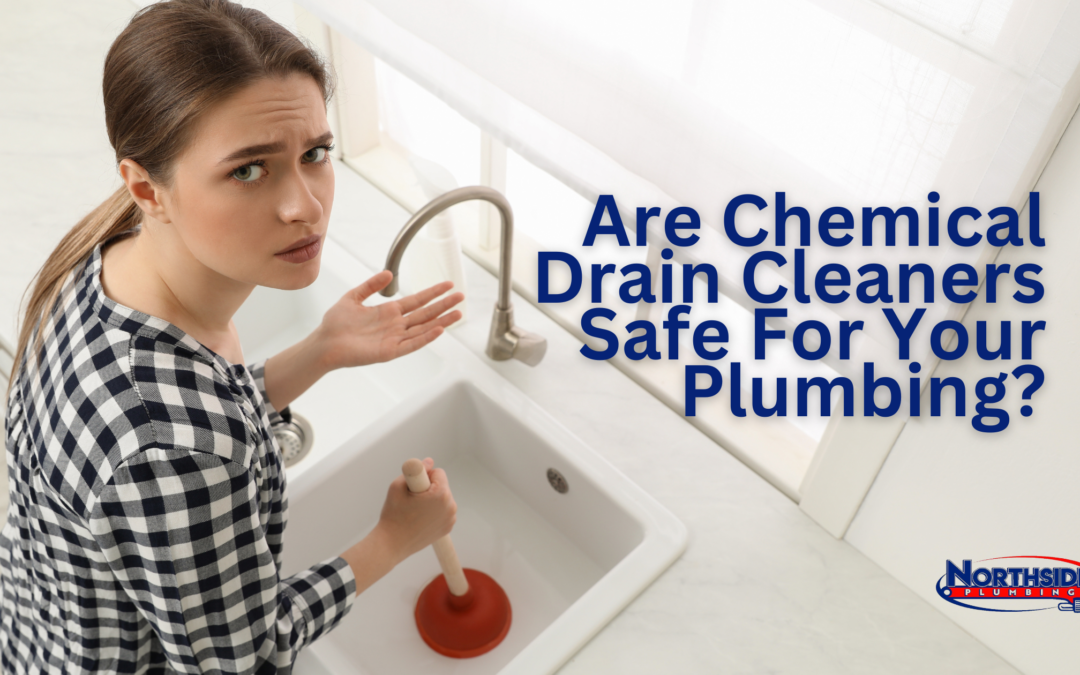As a team of seasoned plumbers, we’ve witnessed firsthand the aftermath of homeowners reaching for chemical drain cleaners to tackle clogged pipes.
While the promise of a quick fix may be tempting, the dangers of these harsh chemicals far outweigh the convenience. In this blog post, we’ll highlight the risks associated with chemical drain cleaners and provide alternative, safer methods to keep your drains flowing smoothly.
Chemical drain cleaners typically contain corrosive and caustic ingredients like lye or sulfuric acid. While they may succeed in breaking down clogs, the collateral damage to your plumbing system is significant. These chemicals can erode pipes over time, leading to leaks and, in extreme cases, causing pipes to burst. The potential harm is not limited to your plumbing; exposure to these chemicals can pose serious health risks to you and your family.
One of the main concerns is the release of toxic fumes when using chemical drain cleaners. Inhaling these fumes can irritate your respiratory system, causing coughing, shortness of breath, and even more severe complications for those with respiratory conditions. Additionally, these chemicals can cause skin and eye irritation upon contact, making them hazardous to handle without proper protective gear.
Furthermore, chemical drain cleaners are not environmentally friendly. When flushed down the drain, these toxic substances end up in the water supply, harming aquatic life and contributing to water pollution. As responsible homeowners, it’s essential to consider the long-term impact of our choices on both our homes and the environment.
Try These Plumber-Approved Alternatives
So, what are the alternatives? Here are some plumber-approved methods to keep your drains clear without resorting to chemical drain cleaners:
Boiling Water: Start with the simplest solution – boiling water. Pouring a kettle of boiling water down the drain can often break down grease and other minor clogs without any harmful side effects.
Baking Soda and Vinegar: Mix equal parts baking soda and vinegar and pour the mixture down the drain. The fizzing action helps break down debris, and the combination is gentle on your pipes.
Plunger: A classic tool in any plumber’s arsenal, the plunger can effectively dislodge stubborn clogs. Make sure to create a tight seal around the drain and use a firm, steady motion.
Plumbing Snake: For more challenging clogs, a plumbing snake or auger can be used to physically remove the obstruction. This tool is effective and doesn’t rely on harsh chemicals.
Enzyme-Based Cleaners: Enzyme-based drain cleaners use natural enzymes to break down organic matter. They are a safer alternative to chemical cleaners and are less likely to cause damage to your pipes.
Regular Maintenance: Prevention is key. Regularly flush your drains with hot water and be mindful of what goes down the drain. Avoid pouring grease, coffee grounds, and large food particles down the sink.
By opting for these alternatives, you protect your plumbing system and the environment and ensure your household’s safety. Remember, a little preventive maintenance goes a long way in avoiding the headaches and potential hazards associated with chemical drain cleaners.
As a plumber committed to the well-being of our clients and community, please consider safer alternatives for maintaining your drains. By embracing these plumber-approved methods, you’ll be able to keep your pipes clear and contribute to a healthier, safer living space. And if you do run into trouble with a clog you can’t clear on your own, reach out to us. We’re always happy to help!



Recent Comments